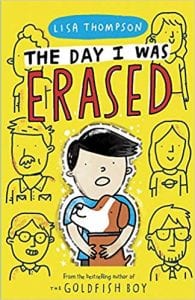The Day I Was Erased by Lisa Thompson
Book of the Week: 27 January 2019
Maxwell’s mum and dad are always arguing, so Monster, the dog he saved from being squashed by an oncoming car when it was lying injured in the road, is a comfort to him when his home-life gets tough. His sister Bex escapes the rows by focusing on school work, but Maxwell’s way of letting off steam is being naughty at school. He often ends up in detention or arguing with his best friend Charlie Geek, whose real name is Charlie Kapoor. One evening, Maxwell ruins a big event at school that everyone was enjoying and runs away to his forgetful neighbour Reg’s house. There he plays with a wooden, egg-shaped, musical box and once Reg falls asleep, decides to go home. The problem is that other people are living in his house and no-one in his life seems to recognise him any more. Somehow, Maxwell has been erased from his own life. At first, it’s bewildering and frightening, but when Maxwell sees the results of his ‘non-existence’ on the people in his life, he resolves to find a way back to normality whilst making a few changes along the way.
If you enjoyed Lisa Thompson’s other books, The Light Jar and The Goldfish Boy this has all the same great qualities. Just like The Goldfish Boy had echoes of the film Rear Window, this one has something in common with the film It’s a Wonderful Life but with a style and content all its own.




